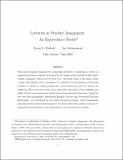Lotteries in Student Assignment: An Equivalence Result
Author(s)
Pathak, Parag; Sethuraman, Jay
DownloadPathak_Lotteries in.pdf (185.5Kb)
OPEN_ACCESS_POLICY
Open Access Policy
Creative Commons Attribution-Noncommercial-Share Alike
Terms of use
Metadata
Show full item recordAbstract
This paper formally examines two competing methods of conducting a lottery in
assigning students to schools, motivated by the design of the centralized high school
student assignment system in New York City. The main result of the paper is that
a single and multiple lottery mechanism are equivalent for the problem of allocating
students to schools in which students have strict preferences and the schools are
indi fferent. In proving this result, a new approach is introduced, that simplifi es and
uni es all the known equivalence results in the house allocation literature. Along the
way, two new mechanisms|Partitioned Random Priority and Partitioned Random
Endowment|are introduced for the house allocation problem. These mechanisms
generalize widely studied mechanisms for the house allocation problem and may be
appropriate for the many-to-one setting such as the school choice problem.
Date issued
2010-06Department
Massachusetts Institute of Technology. Department of EconomicsJournal
Theoretical Economics
Publisher
Society for Economic Theory
Citation
Pathak, Parag and Jay Sethuraman. "Lotteries in Student Assignment: An Equivalence Result" Theoretical Economics, 6.1 (January 2011), 1–17.
Version: Author's final manuscript
ISSN
1933-6837
1555-7561